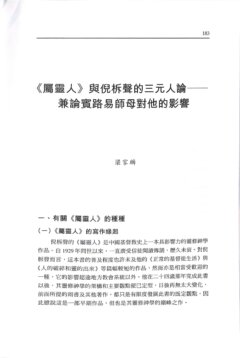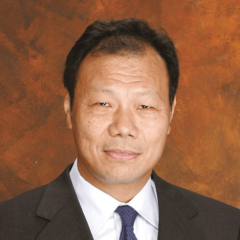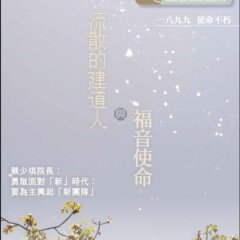《屬靈人》與倪柝聲的三元人論——兼論賓路易師母對他的影響/梁家麟
梁家麟
撮要
本文旨在研究倪柝聲的重要作品《屬靈人》,並從而探討他的三元人論。
《屬靈人》是一本抄襲而非原創的作品,作者大量挪用安汝慈、賓路易師母及慕安德烈等人的觀點,將他們的三元人論引介給華人教會。他在其中最大的貢獻,是為這個靈程觀創造一套中文屬靈詞彙,對形塑日後華人教會的思想起了巨大作用。
三元人論是《屬靈人》的主要內容。作者將人的靈與魂作了本質上的區分,指出前者源自上帝的靈,並分享上帝的神性,後者卻是靈與體結合後自行化生的東西;前者屬上帝,而後者則屬塵世。雖然魂與體的終極來源亦為上帝,卻在本質上與上帝對立;魂與體無法與上帝溝通,上帝必要棄絕它們,並非因它們有罪,而僅是因為它們在本質上是魂與體,罪不過是這個敵擋上帝的本性的自然後果。對倪柝聲的靈程論言,治死魂與體比對付罪更為要緊。
由於《屬靈人》乃抄襲自賓路易師母等人的合成作品,全書的前後部分並不一致。在後半部分,作者轉述賓路易師母晚期為對付靈恩運動而提出的許多修正理論,故對魂與體的觀點與前半部有極大的差異,這是研究倪柝聲者所必須注意的。
ABSTRACT
This essay aims to study the trichotomistic anthropology of Watchman Nee as reflected in his work, The Spiritual Man.
The substance of the book is not original. Nee took liberally from the writings of Ruth Paxson, Jessie Penn-Lewis, and Andrew Murray, introducing their trichotomistic anthropologies to the Chinese church. His major contribution lay in the creation of a new set of theological vocabulary for the description of such a view of spirituality, which was to have a significant impact in shaping Christian thought among Chinese churches.
The Spiritual Man is an exposition of trichotomistic anthropology. Nee made an ontological distinction between the spirit and the soul, pointing out that the human spirit comes from the Spirit of God, and thus participates in His nature, while the soul is merely a derivative from the joining of the body and the spirit. The former belongs to God, the latter is earthly. While Nee recognized God as the ultimate cause for the existence of both the body and the soul, he regarded them as fundamentally opposed to Him. There is no fellowship possible between the two parties. They are destined to be abandoned by God, not because they are sinful, but because they are “physical” and “psychical” in nature. Sin is simply a consequence of such an ontological opposition to the divine. For Watchman Nee, it is definitely more important to mortify the soul and the body than to tackle sin.
Since The Spiritual Man amalgamates the works of several people, inconsistencies can be found between its earlier parts and the later sections. In the second half of the book Nee recounted a number of corrections made by Jessie Penn-Lewis during her later years against the charismatic movement. This resulted in a vastly different view of the soul and the body compared with the first half. Interpreters should beware of this fact.
原載於《教牧期刊》第8期及《建道學刊》第13期合刊(1999年12月),頁183-232。
作者簡介
梁家麟
榮譽院長








